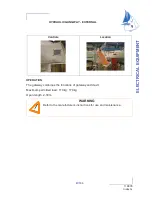
Sailing Yacht SALONA 37
Sailing Yacht SALONA 37
Sailing Yacht SALONA 37
Sailing Yacht SALONA 37
AD BOATS ltd.
AD BOATS ltd.
AD BOATS ltd.
AD BOATS ltd.
Page of 80
67
10.
Environmental protection
AD BOATS has complied with regulations relating to exhaust gas regulation
when making its choice about the inboard diesel engine.
Excessive noise and swell is to be avoided, especially in port areas. All waste
collected during the voyage has to be deposited in the port’s special waste
containers.
In case of oil and fuel leakages that cannot be removed with the usual on-
board means, a specialist should be engaged. Any leaked liquid must be
collected in a canister and should be disposed of in a port. Furthermore, you
should prevent any discharge of pollutants (detergents and similar substances)
overboard. Such substances should be used ashore exclusively.
10.1
Fuel and oil
You should take special care when filling the tank. A (wet) cloth around the
fuel inlet can prevent fuel from dripping into the water. Further notes on the
maximum filling level can be found under 2.2.1. In your engine manual you
can also find a diagram with a curve about the specific fuel consumption thus
offering you some good hints on the most favorable engine speeds.
For a necessary exchange of oil you should use a suction pump because you
cannot drain it off like with a car. The oil has to be exchanged at least once a
year, even if you have operated the engine little.
A well maintained engine should never leak. Still, to prevent even the smallest
amount of oil from being discharged overboard with the pumped out bilge
water, the engine bed was designed to form a closed oil sump. All water from
this sump, possibly mixed with oil, must be pumped into a separate canister
and deposited ashore. You should always have oil-binders aboard.
10.2
Waste
All seafarers honor the rule:
waste is not thrown overboard
. This applies to
biodegradable waste as well. Every yacht should have a regular waste bin or
bag in a locker seat.
10.3
Noise
The wet exhaust pipe of the diesel engine reduces the engine noise
considerably. Additionally, the rubber bearings, elastic couplings and the
engine room insulation minimize emission of sound. Nevertheless, you should
not turn up the engine too quickly and reduce engine speed whenever in
waters with dense traffic.













































